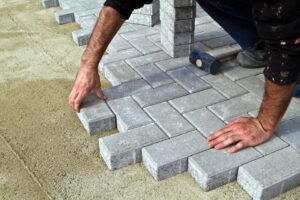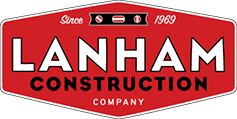
There are endless masonry options for your home. Let’s dig into some information about masonry materials and what jobs their best for.
If you’re considering some masonry projects for updating your home and yard, you’re probably getting into some pretty heavy (pun intended) research. There are lots of ways that masonry can beautify and update a landscape or home – everything from the construction of an outdoor fireplace to the steps to get up to your porch. Masonry is the foundation for both the decorative and practical parts of your home and yard and the process of constructing masonry projects might be more complicated than you think. Let’s dig in to a little information about masonry materials and the types of jobs their best for.
What Are The Common Masonry Materials?
The most well-known masonry materials are brick and stone, but there is more to masonry than just that. Concrete and concrete blocks are also common masonry materials. Natural stone, including granite, limestone, and marble are popular finished materials as well. Stucco finishing materials like mortar and grout or reinforcing materials like rebar are also important parts of the process. Finally, constructing with adobe (clay or mud bricks made form natural materials) or even glass blocks are also considered masonry.
What Are The Best Uses For Different Materials?
Brick and concrete block is typically used for walls and structures. Brick tends to be very cost effective and durable. Both of these are commonly used in heavy traffic areas, including steps and walkways. Stone, either natural or manufactured stones, is good for creating flat surfaces, such as counters, patios, and seats. Stone pavers are the most popular choice for patios, with bricks a close second. Concrete is becoming an increasingly popular material for masonry patios. Stucco tends to be better suited for warmer environments, and is fairly low maintenance. Stucco is typically used for walls and can be tinted or stained to achieve the color you want. Finally, one additional example of masonry work that people often don’t think about is roofing. Clay and concrete are both potential roofing materials, but slate (a natural stone) is the most popular and well known masonry roof material.
Is Masonry A DIY Project?
While there might be some small hardscaping projects that you can DIY (like a stepping stone paver path), generally this type of work is best left to the professionals. DIYing your masonry work can result in a structure that is actually dangerous. Don’t kid yourself into thinking that masonry is just laying bricks or stones and sticking them together with mortar or grout. The process of making something that is safe and secure, properly built and reinforced with rebar as needed, and beautiful is truly an art.
Lanham Construction For All Your Construction Needs
Lanham Construction is an award-winning and dependable construction company dedicated to serving your home or business with whichever construction project you have in mind. Our professional team is eager to serve customers throughout Maryland, Virginia, and Washington D.C. When you pick Lanham, you won’t ever have to worry about the process. We’re here to help every step of the way.
